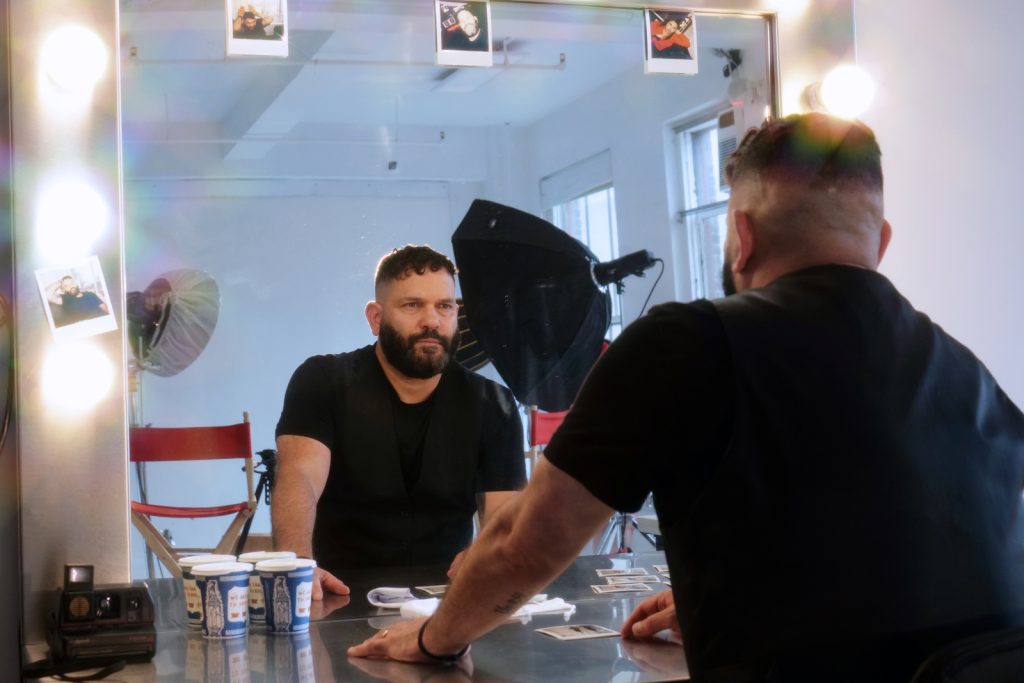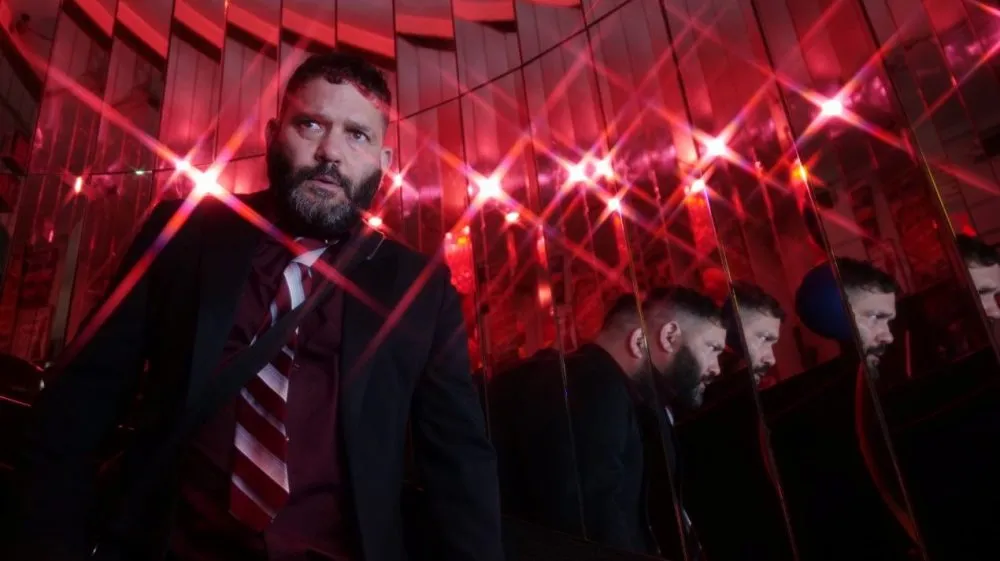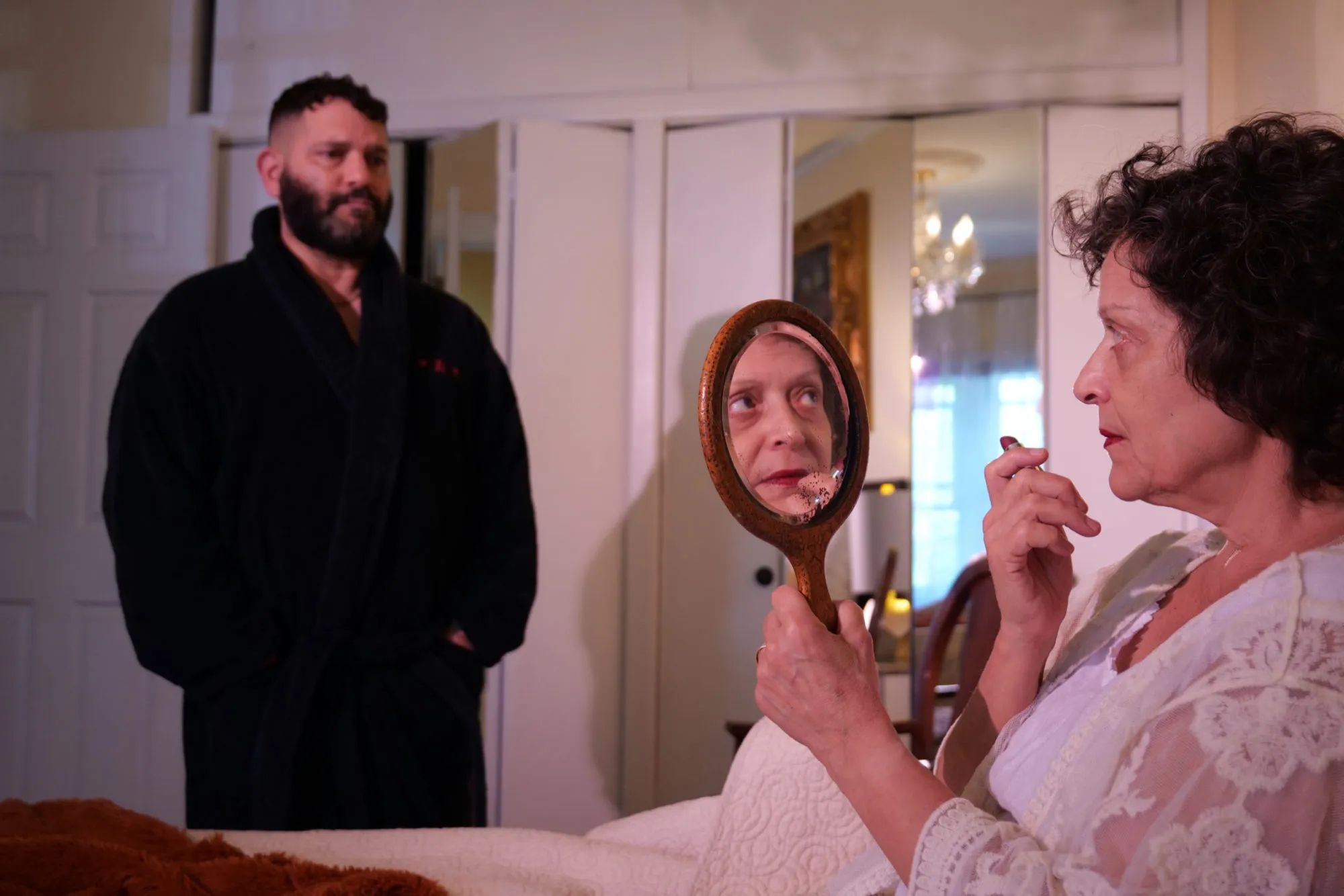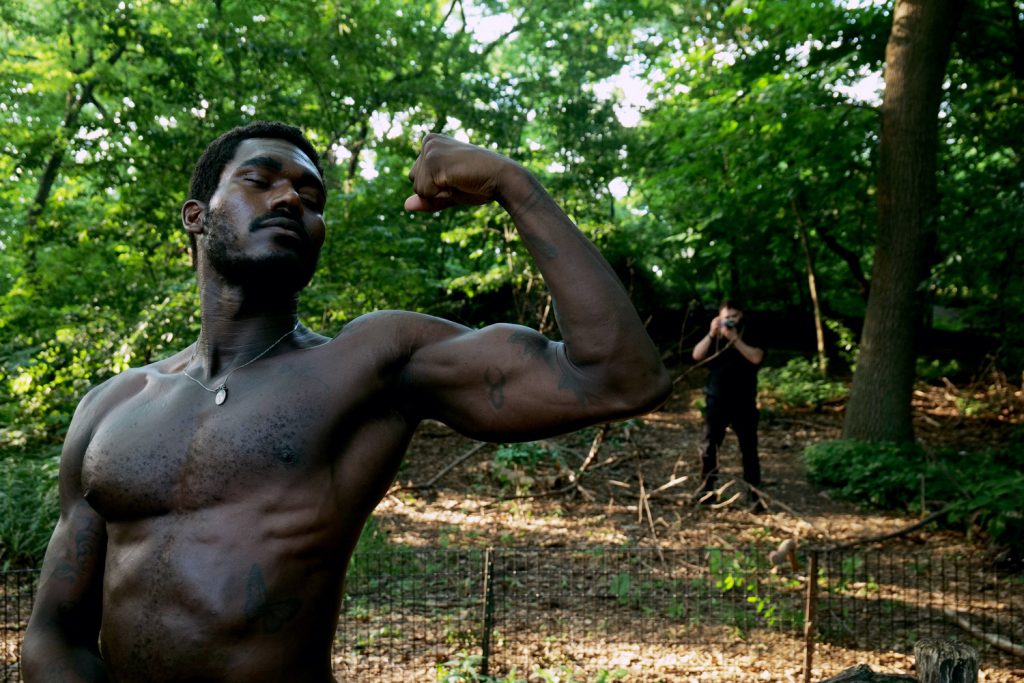
by chris carpenter
Out actor Guillermo Díaz will be commanding movie screens this month as the star of You Can’t Stay Here. Directed by longtime, underground filmmaker Todd Verow (Frisk, Tumbledown, Goodbye Seventies), the movie will open Thursday, February 8 at theatres in Los Angeles and elsewhere.
The plot of You Can’t Stay Here was inspired by real events in early-1990s New York City. The AIDS crisis hangs in the air and cops are targeting gay men in well-known cruising spots. This doesn’t stop aspiring art photographer Rick (Díaz) as he spends his days and nights cruising in Central Park. After he witnesses the murder of a gay man, though, Rick is drawn into a dangerous and sexy game of cat and mouse with the magnetic killer that leads him to question his own sanity.
Díaz is great in one of his few leading man roles to date, and it’s always good to see Verow back in action. The movie was shot in Central Park with the city’s permission. Verow wrote about the origins of his latest production for the film’s press notes.
“During the COVID pandemic, I heard that the Ramble [the notorious cruising area in New York’s Central Park that was featured prominently in William Friedkin’s film Cruising] was jumping,” Verow said. “I went there to investigate and indeed it was full of queer people engaging in all sorts of intimate activity, not all of it sexual. Most of the cruisers were wearing masks, which only intensified the eye contact and intimacy.”
The filmmaker continued: “We had been locked down, curfew-ed, and burned out on Zoom sex and the harsh coldness of Grindr, Scruff and other hookup apps. We needed physical contact — or at least proximity — with other human beings. This got me thinking about cruising and cruising places around the world. These are sacred spaces and, no matter how the police or governments try to beat them back, they will always be cruising areas.”
During this time, Díaz was in New York City working on a TV series. He contacted Verow, saying he was a fan of his work and wanted to make a film with him. Verow was also a fan of Díaz’s work, especially his portrayal of La Miranda in the 1995 film Stonewall, and je messaged him back immediately. They got together for lunch, and Verow told Díaz about his recent experiences in the Ramble and how he wanted to make a film about cruising there. Díaz liked the idea.
The screenplay for You Can’t Stay Here was written by Verow and his writing partner, James Derek Dwyer. “I wanted the film to take place in the early ‘90s, before social media and smart phones and during the height of the HIV/ AIDS crisis, when homophobia — both external and internalized — ran rampant,” Verow said. “The script is loosely inspired by real events during that time but also on the timelessness of cruising and the otherworldliness of the Ramble itself. Real life cruisers rarely, if ever, speak. Everything is conveyed through their eyes. Guillermo’s eyes convey so much; I could photograph them all day.”
In addition to his early, star-making turn in Stonewall, many viewers know Díaz as Huck from his many seasons on the ABC hit series Scandal. He is also recognizable from movies including Bros, Half Baked, Party Girl, High School High and Steven Spielberg’s The Terminal. He is also well-known from Showtime’s award-winning series Weeds (where he played the role of Guillermo, coincidentally/appropriately enough) and NBC’s Law & Order: Organized Crime. He can also be seen with Britney Spears in her video I Wanna Go, and in Beyonce and Jay Z’s video Run alongside Sean Penn and Jake Gyllenhaal. Diaz made his directorial debut with the documentary short film Valley of the Undocumented, which was produced by Russell Simmons and Mark Zuckerberg for Immigrant Heritage Month. Born and raised in New York City’s Washington Heights, he currently resides in Los Angeles.

Díaz recently sat down with The RAGE Monthly to speak about You Can’t Stay Here and other aspects of his impressive, 30-year career. The interview has been edited for length and/or clarity.
Congrats on the movie. It’s good to see you front and center in the whole movie.
Thanks. Yeah, it was nice.
You really got this project rolling. What led you to seek out and work with Todd Verow when you did?
I had booked a recurring role on a show, so that brought me to New York for a year, year and a half. Because it was recurring, I would work two days a week, sometimes one day a week, and I was like “Oh my god, I’m going crazy.” It was a procedural show and it wasn’t very challenging creatively, and so I started to think “Who do I want to work with? Who’s out there, like an indie director that excites me and I would want to collaborate with?” And I thought of Todd. I followed him on Instagram, so I thought “I’m just going to message him. Why not? It’s 2023, right?” [laugh]
So, I sent him a DM and told him that I was a fan of his work and I would love to work with him. I’m also a huge horror film fan so I told him I would love to do something in the horror-thriller genre and would he be into it? He was, so we met up, and the ball started rolling from there.
That’s great. Are you happy with the finished film?
I am, I am. It’s a classic Todd Verow-style movie. I knew he was a guerilla filmmaker. The way he works is very guerilla style with very few takes, and so when I saw it, I was like “OK, this is a true Verow film.” It was kind of exciting because I believe it was the first time that Todd worked with SAG actors and dealt with the union, if I’m not mistaken, so I was able to bring in actors that I love and wanted to work with. It was really exciting and collaborative, which I loved.
How have audiences been responding to the film?
It’s not everyone’s cup of tea and that’s OK. You want everybody to love your movie, but everybody walks away from it wanting to have a conversation and having questions, wanting to understand certain things. That’s good, people always wanting to talk about it. That’s definitely a plus.

In what ways are you like your character, Rick? And in what ways are you different?
I’m like him in so many ways. I grew up in New York City, I’m Latino. I was in my 20s in the ‘90s and I experienced meeting guys through cruising on the street or in a park or what have you. It’s not like now. I think this generation and the previous generation don’t really know what that’s like, so in that sense I’m a lot like (Rick). I lived that experience, not to the extent that Rick in the movie does. I was very much in the closet as well, so that was a similarity. Some of the stuff that happens to my character in the film were experiences that either I had or Todd had.
The ways that I’m not like him? I feel like I would have not gotten caught by the character people are now calling “The Vampire.” I feel like savvy Guillermo in the ‘90s would have been like “What if I punched him in the face and ran?” [laugh] In the film, Rick gets sort of infatuated by him. He’s frightened by him but at the same time infatuated by him. I feel like I wouldn’t have been that way if I was in that situation, but who knows?
You came out publicly in 2011, according to Wikipedia, which was still pretty rare for a well-known actor at the time. What was the reaction like?
I’m so bad with years but I think it was before 2011. I came out in a magazine called Genre in like the late ‘90s. It was when I did Stonewall. My management team told me “You’re going to be asked nonstop if you’re gay once you start doing press, so you’ve gotta figure out if you’re gonna be honest or if you’re gonna be in the closet and say you’re not.” But I was like, “Nope, I’m not lying.” I was 27 when I officially came out to my parents, which was the hardest to do. I had already been out to my friends and I had a boyfriend at the time.
Are there any challenges or obstacles today for out, gay or LGBTQ actors, in your experience?
Honestly, I can only speak for myself and from my experience but if there have been obstacles, I haven’t been privy to them. I move forward and do my work and audition for a ton of stuff. Some I get, some I don’t. I honestly try not to think about that. I’m sure there have been some projects that have come up that possibly the producer or director or someone finds out I’m gay and they’re like “Nah, we’re not gonna work with him.” But again, I’m not privy to that so it’s not my problem, it’s their problem. I’ve experienced no problems, no pushback really. I’ve been super fortunate. I think what’s been good for me is that I haven’t kept [being gay] a mystery. I’ve been able to say, “This is me, take it or leave it.”
Good for you. What’s your advice for any young LGBTQ actors who want to make it in the industry?
Quit acting right now and go do something else! [laugh] It is such a hard, difficult business to be in. If your heart isn’t in it 150,000%, you should stop doing it and think about something else. Truly, like seriously, I’m only in this business and became an actor because I knew in my heart and my soul that I was gonna make it no matter what, and I never had any doubt. Regardless of all the rejection from auditions, which is a normal thing. But it’s difficult and again my advice is if you don’t want this a million thousand percent then go figure out something else, because that’s what it takes. And sleep with as many producers as you can. [laugh] I’m joking!
What are you working on now? What do we have to look forward to?
[Laugh] I just directed — oh my god, it’s already been about two years — but I directed my first feature film, so now I’m in the post-production process. It’s a movie called Dear Luke, Love Me that a friend of mine, Mallie McCown, wrote. It’s sort of a dysfunctional-relationship drama. It was the hardest thing I’ve ever done. We raised all the money ourselves through a Kickstarter campaign, shot the movie for like a month, and then we did the editing and now we’re in the post-production process. We’re starting to submit it to festivals and stuff so hopefully I’m going to be doing the festival thing for a little while, fingers crossed.
And then Todd and I are talking about doing another movie together which, knowing how Todd works, that’s probably going to be the first movie that comes out. He works so fast. You’ll be interviewing us for that movie like in a month. [laugh]

Chris Carpenter has been writing about entertainment since 1996 and a member of Team Rage since 2012. He is a founding member and vice president emeritus of GALECA: The Society of LGBTQ Entertainment Critics.